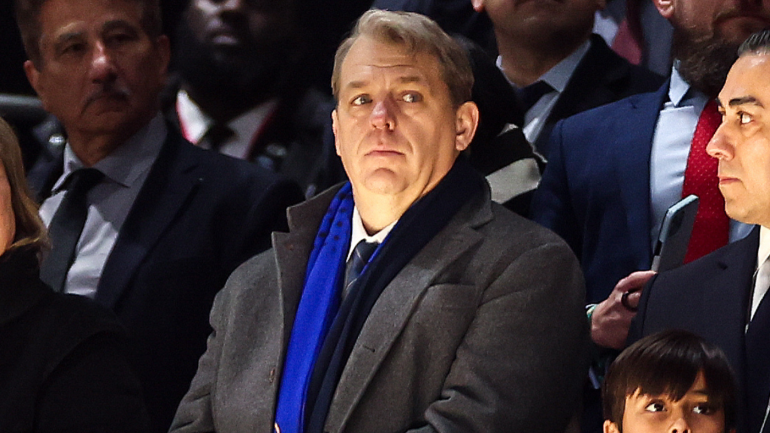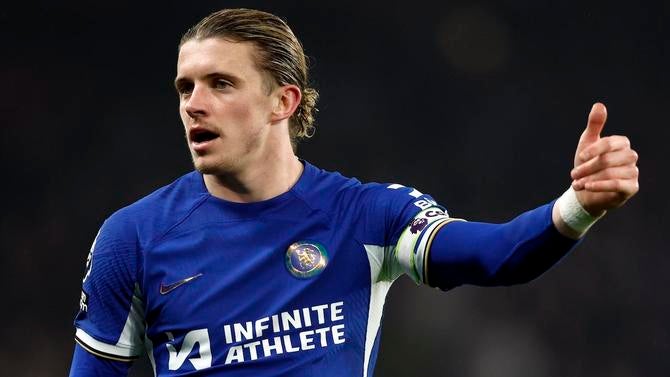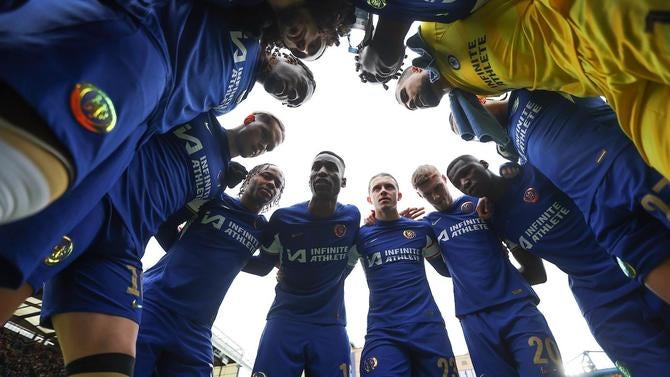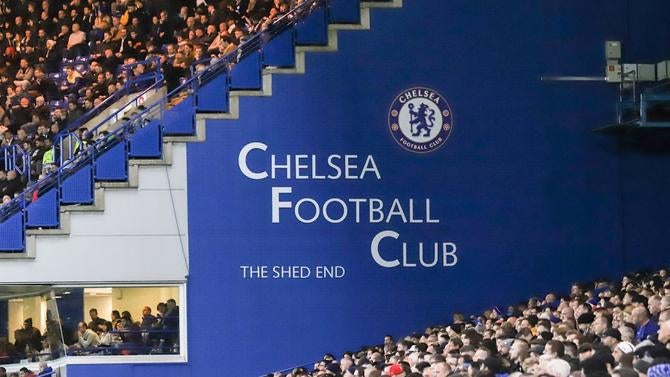
The early months of the English summer have long been a time of great anticipation along the Fulham Road. No matter whether the previous season had been one of distinction or disaster, the Chelsea squad could radically change in the space of a few weeks. If there was a burgeoning young star on the market or an established talent with trophies aplenty to their name, Roman Abramovich had to have it for Chelsea.
Michael Ballack, Andriy Shevchenko, Eden Hazard, Kai Havertz: All were the big names on the market at some stage during Roman Abramovich's 19 years at the club. All were lured to Chelsea, no matter the cost or even their utility for the managers. Finances be damned, £900,000-a-week losses were the cost of doing business for an owner who viewed his club as a means for reflected glory, a burnished profile and pleasure.
Chelsea were never going to get a comparable benefactor when sanctions from the British government put the club on the market in 2022. Anyway, even if another Abramovich wanted to buy his way to silverware, the majority of Premier League owners do not want to compete with sovereign wealth funds and private individuals that run their football clubs for the benefit of global soft power.

Golazo Starting XI Newsletter
Get your Soccer Fix from Around the Globe
Your ultimate guide to the Beautiful Game as our experts take you beyond the pitch and around the globe with news that matters.
Thanks for signing up!
Keep an eye on your inbox.
Sorry!
There was an error processing your subscription.
Hence a new era of curbs on extravagance, a time where the Premier League's Profit and Sustainability Rules (PSR) have teeth. Don't Chelsea know it. Their current owners may not be ploughing their own personal wealth into a reputation management project, but they have been spending like people who do, with over a billion pounds committed into mostly young players on ultra long-term contracts. Had those prospects guided the Blues to Premier League contention and regular qualification for the Champions League, Chelsea's owners might have been hailed for setting a new recruitment blueprint for the industry. Instead, the club is extremely likely to miss out on the revenue from top tier European club football for a second season in a row at a time when its cost base has been swollen by the amortization of its transfer binge.
Now the summer sky is darkening with clouds, with supporters not dreaming who might arrive at Stamford Bridge but who ownership may feel compelled to sell. That is what they will have to do, preferably before the June 30 soft deadline that will inform the Premier League's 2023-24 PSR calculations.
Why Chelsea's 2024 summer looks bleak
As football finance expert Kieran Maguire puts it, "2024 is probably looking like a bit of a car crash."
According to analysis carried out for CBS Sports, prior to any summer sales Chelsea are on course for a second year out of three where their pre-tax losses are in excess of £100 million. This puts Todd Boehly, Behdad Eghbali and the rest of the ownership group in an extremely tight position. The Premier League allows exceptions for PSR calculations that include spending on academy football, the women's game and community investment. Even with generous allowances for those, CBS Sports calculations estimate that Chelsea's losses post-mitigations for a three-year window would be around £210 million, double the Premier League's top limit.
Chelsea, for their part, maintain they are not concerned and that they are confident they can comply with all Financial Fair Play and PSR requirements, avoiding any league imposed penalties.
Across the league, those penalties have become realities for teams already. Everton and Nottingham Forest have already been hit by points deductions for breaches, some way short of what Chelsea's might be. Everton cleared their £105 million limit by £19.5 million and Forest's breach was £34.5 million over their threshold of £61 million (a lower amount as they had only just been promoted to the Premier League). Both were judged to be significant breaches by independent commissions.
There is certainly a path to compliance for next season for Chelsea. Sell, sell, sell.
"I don't know how you can view the financial situation for Chelsea in 2023-24 and reach a conclusion that they won't be forced to sell before June 30 or at least try their best given the Nottingham Forest decision," says a leading analyst who spoke to CBS Sports on condition of anonymity. "When it is suggested that Chelsea need to get £100 million from player trading in that two-week window when the Euros is going on, that seems right to me."
Chelsea's most likely sales

Conor Gallagher, a crucial starter in midfield whose presence has often brought the best out of nine figure additions Moises Caicedo and Enzo Fernandez, is expected to leave as he approaches the final year of his contract. Ian Maatsen's contract is said to contain an attractive release clause that would be worth £35 million. Given his form at Borussia Dortmund, that may get activated. Newcastle have a £30 million purchase option on Lewis Hall that is widely expected to be activated as well. Trevoh Chalobah and Armando Broja might also go if a suitor can be found.
As academy graduates, all four would represent pure profit in accounting terms, whereas other sales would have to be offset. One thing Chelsea have historically been very good at, even in their first post-Abramovich summer, is clearing their books. Maguire notes they have made five times more profit from player sales over the past decade than Manchester United and twice what Liverpool and Manchester City have earned.
Going into the summer, however, Chelsea may well be in the sort of high pressure situation that does not lend itself to good deal making. Beyond that, they simply may not have as many Champions League winners to offer. While sources in Saudi Arabia expect some marquee names to move to the Pro League, there is not expected to be the same gold rush in Europe that ownership struck last year when they moved out Kalidou Koulibaly, Edouard Mendy and N'Golo Kante.
Even so, there are plenty of first-teamers, loanees and academy prospects to offer to potential suitors. For that reason a strong majority of those surveyed for this article believe that the club can find their way to PSR compliance this summer.
"It will be an interesting market," says Maguire. "There are some clubs that have done good business who have a huge amount of latitude when it comes to the ability to buy by the end of this financial year. A top player from Chelsea is not going to go to a club like Brighton or Brentford, no matter how good their finances are.
"I don't think we're really talking necessarily first-teamers. Manchester City sold four youth team players to Southampton 18 months ago, one of whom [Romeo Lavia] is now ironically at Chelsea. City have sold Cole Palmer for £40 million too, one of the best decisions Chelsea have made in recent years."
The June 30 deadline looks more ominous in light of an independent commission's scathing assessment of Forest's management of the sale of Brennan Johnson, who joined Tottenham on transfer deadline day for £47.5 million, long after offers from Atletico Madrid and Brentford had been dismissed. By then, he had played 240 of a possible 270 Premier League minutes, something which in itself convinced the panel it could not be used as a factor to mitigate Forest's four-point penalty. That precedent might rob Chelsea of any hope of letting negotiations ride late into the window in pursuit of the best deal but there is wiggle room.
"There is a little bit of latitude in the accounting rules," notes Maguire. "Let's say that Chelsea agree heads of terms with Newcastle for Gallagher: They've agreed a fee in principle, the player has agreed personal terms and we're just haggling over some of the small print. If he's then sold on July 4, you could backdate that to June 30. That's what is referred to as an adjusting post balance sheet event. The fact that the deal hasn't been physically signed by June 30 isn't actually an issue, provided you've got an audit trail.
"From the buying club's point of view, it doesn't mean much when the deal is concluded. If I buy a player on June 30, I don't start amortizing him until that date. I have not even paid him any wages. Buyers are quite sanguine about this, they just want the player for preseason, tours and the opening games."
Mason Mount's sale last summer to Manchester United, announced on July 6 and worth an initial £55 million, would appear to be one such post balance sheet event, according to the 2022-23 financial report of parent company BlueCo 22. Chelsea declined to comment on the subject when asked.
Whether taking that Mount sale off the 2022-23 books would have put Chelsea in PSR trouble when the Premier League made its charge last month is not entirely clear, though given the £90.1 million pre-tax loss they announced it is a fair question to ask. There are certainly good arguments for Chelsea to book a deal in an earlier year's accounts even if they don't need it to bring them into PSR compliance, especially if they expect their cost base to significantly fall in coming seasons. There's nothing untoward going on, simply the kind of strategic accounting that a more stringent PSR forces all clubs to contemplate.
The issue at Stamford Bridge is that there is only so much that strategic accounting can do to chip away at deficits in the absence of new sales.
Problems don't end this summer for Chelsea

CBS' analysis of Chelsea's finances suggest that there is no imminent prospect of the picture improving. A projection for their 2024-25 accounts predicts another operating loss, this one in the region of £130 million. This far out, certain assumptions have to be made. One is that commercial revenue will remain static, given that they will almost certainly be out of the Champions League again. Soon after Clearlake Capital bought Chelsea, part owner Jose E. Feliciano spoke of his belief that the club could register a billion in revenue during their ownership. That's a far cry from theses assumptions.
"My suspicion is that when Feliciano said that he was looking at Chelsea's commercial revenue relative to the traditional big six," says the analyst. "It was an underperformer there and so there was a sense that Chelsea had low hanging fruit. The challenge with those assumptions is that they are conditioned on a certain legacy performance that's quickly moving away.
"In the absence of sporting improvement, it's not clear how they would get to those numbers."
Our second set of assumptions are based around involvement in competition outside Europe. Given the state of the Premier League table, the Champions League looks beyond Mauricio Pochettino's side, who would have to make up a 14-point gap in 11 games just to make the fifth spot that might, dependent on English club's performances in Europe this season, unlock another seat at the top table. The Europa League and Europa Conference League are possibilities either through the FA Cup, where Chelsea face Manchester City in the semifinals, or league finish. The former does not pay out significantly until teams reach the latter stages of the competition, and it has been suggested that Chelsea might not even take up a spot in the Conference League.
There is, however, FIFA's Club World Cup to look forward to in the summer of 2025, where Chelsea will compete as one of the Champions League winners. CBS' projections assume that all income from that competition will be booked in the 2024-25 accounts. Finally, the model assumes a significant ticket price rise of 15 percent. Chelsea are consulting with supporters and no confirmation has been made as to whether prices will increase after more than a decade without price rises. This has caused much concern among fans, with the Chelsea Supporter Trust warning last week of "irreversible toxicity" if prices are hiked.
A double-digit price rise might be at the outer end of realistic options, but adding that to the calculations gives Chelsea the most wiggle room to sneak under the £105 million, three-year rolling limit. Still, even after all those factors are considered, the indications are that there will be another £100 million-plus hole to be plugged by additional revenue. That will not be the Champions League, which earned the Blues around £80 million when they reached the quarterfinals in 2022-23. Adding 50% to their commercial revenue while out of the Champions League seems unlikely. Once more, player sales look to be the obvious avenue. There are only so many academy graduates that can be sold on for big money before awkward conversations have to be had about the Malo Gustos and, perish the thought, Cole Palmers.
The downside of Chelsea's amortization
And this is where Chelsea's great veil of amortization gets drawn back. The Blues were able to spend more than $1 billion in the transfer market since the takeover by spreading the cost of big money signings such as Mykhailo Mudryk, Moises Caicedo and Enzo Fernandez over contracts significantly longer than the usual four to five years that might be handed out. When it comes to reflecting those transfers in their accounts, clubs spread the cost over the life of a player's contract. Mudryk's $109 million deal might look staggering on paper, but spread over the cost of a seven and a half-year deal it is rather less of a burden in any one year. That Chelsea managed to secure these deals before UEFA and the Premier League moved to limit the number of years a fee could be amortized over made some see a whiff of genius from ownership. Few appreciated that governing bodies might have a point when they said they were acting to discourage clubs from locking themselves into squads over the extreme long-term when the side effects could be profound.
Chelsea's annual amortization costs are not that out of sync with the rest of the Premier League, according to finance writer Swiss Ramble. The £160 million they have on their books is not even the highest in England, trailing Manchester United at £170 million. A key difference, however, (aside from the revenue gulf between those two clubs) is the speed at which United could bring theirs down. Per Capology, Erik ten Hag's side have 11 first-team players on their books, with three or four years left on their contracts come the end of the season, 20 who would be out of contract in two years.
At Chelsea, there are 23 players who are tied to the club to 2028 and beyond. Many of their most expensive acquisitions -- Mudryk, Fernandez, Caicedo, Nicolas Jackson and Romeo Lavia among them -- are contracted until 2030. If the plan had clicked, Chelsea might just be in dream land now, a squad of bright young things achieving greatness while tied to contracts that are relatively cheap by Premier League big-six standards. Instead, they seem to have found themselves in the downside scenario. Amortizing the value over seven or eight years means that every year the book value of Chelsea's squad is cut by a far smaller fraction. For it to make any financial sense for Mudryk to be sold, for instance, someone needs to be paying more than the asset is worth to Chelsea. That almost certainly will not happen when his paper value remains so high.
Given how close Chelsea appear to be to the PSR line, there does not appear to be much room for creativity. In 2022, Chelsea wrote down the value of some assets on their playing staff -- widely assumed to be Romelu Lukaku -- but doing so again would still count against them when the Premier League looks at their books.
How Chelsea can still recover

What ways out are there then? An upswing in results on the field leading to Champions League qualification would greatly help. It is worth noting that under Pochettino, they have not looked as far away from a top-four side as the table might suggest. They have the fifth-best expected goal difference in the Premier League, and according to Understat rank sixth in expected points. It is possible that a young team takes strides forward in its performances next season and that losses such as Gallagher are more than offset by regular minutes from the likes of oft-injured Christopher Nkunku and Reece James. If Chelsea are going to get back in the big time, they will probably need to do it largely with what they have. The figures above would suggest that there is precious little room to add players who cost as much as Victor Osimhen.
Even Champions League revenue would only ease the pressure on the books from 2025-26 onwards, but given how long the amortization charges will hang over Stamford Bridge, that would have to do. The club hierarchy clearly believe there is more to do to drive revenue growth, and in November, they appointed Casper Stylsvig, who has had great success at both AC Milan and Manchester United. Whatever the commercial department can achieve, it would not improve the revenue system quite like the 60,000-plus stadium the rest of the big six will have when Manchester City complete expansion work on the Etihad, likely in time for 2025-26. A modern stadium with top corporate facilities in one of the world's most affluent neighborhoods would change Chelsea's financial outlook, but progress on that front has been as slow under Clearlake as it was Abramovich.
The deus ex machina for Chelsea might just be that the rule book changes. The Premier League confirmed on March 11 that its clubs had "agreed to prioritize the swift development and implementation of a new league-wide financial system." It has been suggested that this could take on a form very similar to the squad cost controls UEFA is looking to introduce, which limit teams to spending a set proportion of their revenue on transfer and agent fees as well as player salaries. This will start at 90% next season before dropping to 80% the following year and settling at 70% in 2025-26.
That might seem like manna from heaven to Stamford Bridge, but anything that includes amortized transfer fees will be hard to navigate if Chelsea wish to invest in their squad further. Swiss Ramble's analysis puts their squad cost ratio at 87 percent. Once again, the solution to that would be more profit from player sales. More radical changes to the Premier League handbook might enhance their wiggle room, but there are not many of Boehly's contemporaries who would want to be dragged into a scenario where sovereign wealth funds can spend with abandon. The curious thing about all of this is that no one would have imagined Boehly and the rest of Clearlake would be quite so profligate when they took the reigns from Abramovich. Private equity does not invest in businesses so it can be depicted as clowns running a loss-making business.
Whether Clearlake were investing for profit or pleasure, there is precious little of either for them now, following their billion-dollar splurge that looks to have seriously backfired. Looking at financial projections only makes this look worse. The real pain might just lie ahead for Chelsea.





















